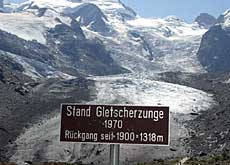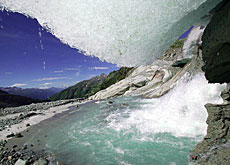Alpine ice melts as winter seasons heat up

Switzerland’s glaciers are continuing to shrink as a result of climate change, according to a study by the Academy of Sciences.
Experts also noted an increasing number of warm winter spells in the Alps over the past three decades.
Seventy-five of the 110 glaciers in the Swiss Alps shrunk, while eight grew slightly over the 2003-2004 period, the Swiss Academy of Sciences said on Monday.
Another seven remained virtually unchanged, while readings from 20 glaciers are still pending.
Experts said the Trift glacier in central Switzerland was again top of the list, losing 134 metres in length.
The Morteratsch glacier in the southeastern Alps near the border with Italy was found to be growing at the fastest rate.
However, the report said the ten-metre increase was only a local phenomenon and should not be considered to be a consequence of lower temperatures or more snowfall.
Scientists also found regional differences when they measured the volume of three glaciers in eastern and central Switzerland.
Warm spells
A separate survey by the department of geosciences at Fribourg University found a marked increase in the number of warm winter spells in the Swiss Alps over the past 35 years.
Temperature anomalies sometimes exceeded 16°C, said the author of the study, Martin Béniston.
The warm spells were related to a specific meteorological condition over the North Atlantic Ocean and resulted in warmer temperatures, less precipitation and more melting ice and snow in the Alps.
Béniston said heat waves had an impact on the environment and the economy, although warm winter spells were not perceived in the same way as hot summer seasons.
He said warm spells affected water resources, the production of hydroelectric power and ski-resort revenue.
The study is based on records from ten mountain weather stations in Switzerland.
swissinfo with agencies
75 Swiss glaciers shrunk during the period 2003-2004.
15 remained unchanged or grew slightly, while readings from another 20 glaciers are still pending.
Temperature anomalies of more than 16°C have been recorded in the Swiss Alps over the past 35 years.

In compliance with the JTI standards
More: SWI swissinfo.ch certified by the Journalism Trust Initiative










You can find an overview of ongoing debates with our journalists here . Please join us!
If you want to start a conversation about a topic raised in this article or want to report factual errors, email us at english@swissinfo.ch.